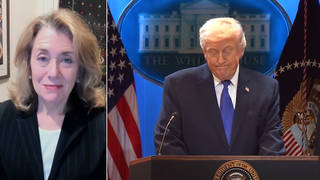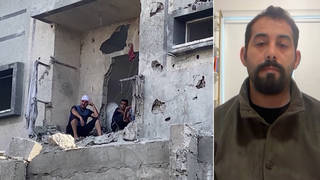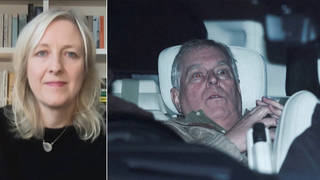
Ahead of the Mother’s Day holiday in the Untied States, we speak to Duha Latif, a mother of two children in Gaza, about life for mothers living under Israeli occupation and assault. Democracy Now! last spoke to Latif over a year ago, when she was attempting to evacuate Rafah with her family. She now resides in a tent in Khan Younis and struggles to feed her family as Israel’s blockade has created widespread famine throughout the Gaza Strip. “We are not living. We are enduring,” says Latif. Her children, 8-year-old Amir and 3-year-old Karim, are suffering the effects of hunger and malnutrition. “The loss they are living is more than just the absence of food — it’s the absence of life as they knew it.”
Transcript
AMY GOODMAN: This is Democracy Now! I’m Amy Goodman.
In his last public appearance before his death, Pope Francis addressed Easter Sunday Mass and repeated his call for a ceasefire in Gaza. As his final gift, Pope Francis donated one of his popemobiles to be turned into a mobile healthcare unit for children in Gaza. He gave his blessing to the initiative before his death.
As Mother’s Day is celebrated here in the U.S. on Sunday, thousands of children in Gaza, many under the age of 5, are at imminent risk of dying of starvation due to Israel’s total blockade of food, water, medical supplies and other vital aid. According to UNICEF, more than 9,000 children have been admitted for treatment for acute malnutrition so far this year.
This week, we reached out to Duha Latif, a teacher from Gaza, mother of two young children, spoke to her last year when she was trying to evacuate from Rafah with her family. She’s now living in a tent in Khan Younis for displaced people.
DUHA LATIF: Hello. I’m Duha Latif. I’m a mother for two children: Amir, 8 years, and Karim, 3 years. I was once a teacher of simple trust and gentle hopes. Now I’m a witness to the slow collapse of existence.
A year ago, I appeared on Democracy Now! when I was still in our home in Rafah city. That day, I spoke to you about our hope for evacuation, and I believed that my second appearance would be from a safer place, a warm home or a balcony overlooking an ordinary life. But today I speak to you from Khan Younis, where there is no home, no world and no life as you know it, claiming it’s not an emergency in Gaza, it’s a part of the landscape, a natural extension of a long siege and a world that has chosen to become used to seeing us suffer. We are not living. We are enduring. When the entire day becomes struggle to find a single meal, a small detail — a cup of tea, the smell of bread, a tomato — become extraordinary thing, almost like a miracle.
We are living a real famine, not metaphorically, but hunger that grips the gut, turning every meal into a battle and every loaf of bread into a small victory. People race each other for a handful of flour. They stand in the long lines, not to buy food, but to search for it. Markets are empty, and the shelves mourn themselves. Torn bags and empty boxes have become a daily scene. Vegetables, one or two types hardly worth mentioning, are sold at a price — prices beyond belief. A single piece is sold, like a pear, in an auction. No fruit, no milk, no eggs, no oil. Everything is rare, and everything is expensive, even water. People now cook what’s left of lentils as if they are cooking hope.
And mothers, like me, hide our hunger so our children won’t see it. Amir, my son, asks me every day, “Mom, when will we eat pizza again?” I say, “Soon,” and I smile at him while my heart breaks piece by piece. Karim doesn’t speak much, but he runs after anything that looks like food, as if instinct has outrun language. The loss they are living is more than just the absence of food. It’s the absence of life as they knew it, the absence of the love they once felt, and the absence of the hope that once filled their eyes.
I spoke not to complain, but to remind you that Gaza is not just a news headline. It’s souls waiting for salvation. I’m Duha Latif, and this is not a temporary story. This is my life now.
AMY GOODMAN: Duha Latif, a teacher from Gaza, mother of two young children, speaking to us from Khan Younis in Gaza.












Media Options